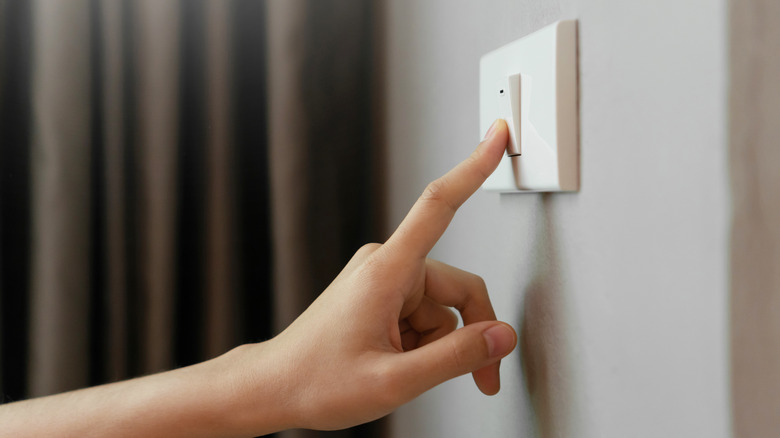Signs You Shouldn't Rent The Apartment You're Touring
Apartment hunting can be an overwhelming and stressful — albeit exciting — process. Finding one you love can become exponentially more difficult if you live in a city with a population that outnumbers the amount of available and affordable units (we're looking at you, Big Apple.)
And while finding the perfect apartment in your price range isn't always possible, particularly during a hot, competitive housing market, you should never settle on one that you know upfront won't be good for you or that won't meet your needs. According to LinkedIn, where you live has a very real ability to impact your mental and emotional health, which is why choosing an apartment that meets at least a large amount of your personalized checklist is important.
Though everyone has different checklists and preferences when it comes to choosing an apartment, there are some features across the board that experts agree all renters should be cautious of.
You can't see the unit beforehand
If the person or company you are renting from won't let you see the actual apartment available for rent, this is a sure sign you should run in the other direction. Many landlords and property management companies will often show model units, which are often branded as "identical" to the available unit you are inquiring about. Spoiler alert — they usually are anything but.
Though the model unit may be identical in layout and amenities to the unit you are considering, the model units tend to be much newer, nicer, and better maintained than the rest of the apartments. Signing a lease based on a model unit and expecting your apartment to be identical is an easy way to be disappointed — and by the time you realize that you have been duped, it may be too late. You may already be locked into a lease you cannot get out of.
Rent Hop says this is often a sneaky and underhanded way for landlords to hide any damage or issues with the specific unit they are renting, which is why not being able to see the actual apartment beforehand should always be treated as a red flag.
The lease has a mold waiver or mold clause
Believe it or not, some landlords and property management companies will try to sneak in an added mold clause that, when signed, effectively leaves the renter responsible for any mold damage — even if it isn't their fault, such as in the event of a water pipe burst or leak. Because Avail says there is no federal law assigning responsibility to the landlord when handling mold problems, some landlords may try to legally pass the blame onto their renters to avoid having to be responsible themselves. Though mold clauses are not extremely common, signing a lease containing one can be a costly mistake, potentially saddling you with expensive and time-consuming repairs that you weren't even at fault for in the first place.
Similarly, landlords often include a mold waiver in their lease, which essentially states that the property hasn't been tested for mold. While the landlord would technically be the one who has to cover any mold issues that do arise in this case, it's important to note that even if you aren't putting yourself in a position to cover mold issues legally, you are running the risk of potentially exposing yourself to dangerous and unhealthy living conditions.
According to the CDC, prolonged mold exposure can cause respiratory issues such as cough, wheezing, and shortness of breath — with those issues being severely exacerbated in people with preexisting conditions such as asthma.
There is a lack of communication
Lack of communication or a general delay in response from the leasing office or landlord can foreshadow communication issues and a lack of response down the road if issues with your apartment arise or you have any questions that need to be answered. According to Bay Property Management Group, a surefire sign of a good landlord is good communication — simply because a landlord's job is to move empty units, and therefore should want to be as helpful and communicative as possible during the inquiry process.
If your initial experience with a landlord or leasing office starts with them dodging calls and taking a long time to follow up with answers to your questions, this is often a major red flag. If the person you are in contact with during the initial inquiry process is flaky while trying to sell you on an apartment and gain additional revenue, there is often little reason to believe things will improve once you sign a lease.
Boden News says a lack of communication upfront can lead to a lack of communication when it really matters, like when you have emergency issues with maintenance or pressing questions regarding your monthly payment that need to be addressed in a timely manner.
The utilities don't work properly
An apartment's utilities should always be fully functioning when a new renter moves in, and utilities not being up to par should be considered a dealbreaker when choosing to rent an apartment you are touring.
Upon viewing a new apartment, Rent Hop suggests trying out the air conditioning unit to ensure it is in working order, turning all the lights on and off, and running all the faucets for several minutes to ensure there are no electrical or plumbing issues.
While not signing a lease on an apartment that doesn't have functioning appliances and utilities might seem like a no-brainer, many landlords and property management companies still manage to entice renters by promising to fix outstanding utility issues once you've moved in. Without signed legal documentation that states your landlord will replace or repair broken or malfunctioning utilities, Rent Hop says you should simply assume that they won't. It's easy for someone to make promises when they are trying to sell you on something and make money by locking you into a year-long lease, but when it comes time to deliver on those promises once the lease is signed and their profit incentive is gone, their tune often changes.
They only accept cash
While paying your monthly rent or application fees in cash might not seem like a big deal, experts say that a landlord that requires payments to be made in cash most likely should not be trusted. According to Bay Property Management Group, a landlord's goal is to make money on their rental units — and therefore, a legitimate landlord will accept multiple forms of legal tender like checks, money orders, and credit/debit card payments. Money is money, right?
And while a landlord who accepts cash shouldn't automatically be branded as shady, one who exclusively accepts cash or pushes renters to pay them in cash might be, as cash is considered the least secure form of payment. A landlord who insists on being paid in cash might be trying to illegally evade taxes or, even worse, running a rental scam exclusively designed to con renters out of their hard-earned money.





